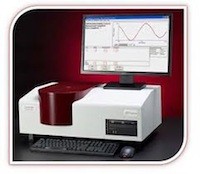Channels
Special Offers & Promotions
Optimised Zeta Potential Measurement in Organic & Aqueous Media
 Testa Analytical Solutions e.K reports that its Nanobrook ZetaPALS zeta potential analyser is uniquely optimised to make sensitive and precise measurements in both organic and aqueous media.
Testa Analytical Solutions e.K reports that its Nanobrook ZetaPALS zeta potential analyser is uniquely optimised to make sensitive and precise measurements in both organic and aqueous media.
Typically making zeta potential measurements in organic (non polar) solvents requires much higher sensitivity than in aqueous (polar) solutions. The Nanobrook ZetaPALS analyser achieves this using phase analysis light scattering (PALS). Using proprietary PALS technology, the Nanobrook ZetaPALS can be used to make zeta potential measurements up to 1,000 times more sensitive than traditional light scattering methods based on the shifted frequency spectrum.
Made of PEEK with a Palladium (Pd) electrode assembly - the Nanobrook ZetaPALS measurement cell is resistant to the widest range possible of solvents, and offers excellent chemical stability, easy cleaning and long-term top performance. Precision Peltier temperature control enables precise zeta potential measurements from -5 °C to 110 °C. For laboratories tasked with just analysing aqueous solutions inexpensive disposable plastic cells can be used with the high performance electrode assembly. For applications in organic solvents, quartz cells are available.
Almost all particulate or macroscopic materials in contact with a liquid acquire an electronic charge on their surfaces. Zeta potential is an important and useful indicator of this charge which can be used to predict and control the stability of colloidal suspensions or emulsions, for example. The greater the zeta potential the more likely the suspension is to be stable because the charged particles repel one another and thus overcome the natural tendency to aggregate. The measurement of zeta potential is often the key to understanding dispersion and aggregation processes in applications as diverse as water purification, ceramic slip casting and the formulation of paints, inks and cosmetics.
Testa Analytical Solutions e.K. is a company dedicated to supplying the best possible instrumental solutions for characterization of polymers, particles, nanomaterials and proteins. Drawing upon over 30 years' experience of technologies serving these markets, the staff at Testa Analytical are happy to share their knowledge with researchers worldwide to help provide them with a working solution for even the most demanding applications.
Media Partners


